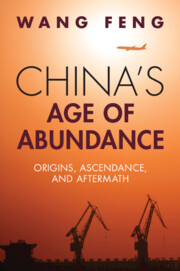
-
Select format
-
- Publisher:
- Cambridge University Press
- Publication date:
- March 2024
- April 2024
- ISBN:
- 9781009444934
- 9781009444897
- 9781009444927
- Dimensions:
- (229 x 152 mm)
- Weight & Pages:
- 0.53kg, 272 Pages
- Dimensions:
- (229 x 152 mm)
- Weight & Pages:
- 0.4kg, 272 Pages
You may already have access via personal or institutional login
Book description
Between the 1980s and the present day, China has experienced one of the most consequential economic transformations in world history. One-fifth of the Earth's population has left behind a life of scarcity and subsistence for one of abundance and material comfort, while their nation has emerged as a preeminent economic and political power. In a systematic historical and sociological analysis of this unique juncture, Wang Feng charts the origins, forces, and consequences of this meteoric rise in living standards. He shifts the focus away from institutions and policies to offer new perspectives based on consumption among poorer, rural populations as a driver of global economic change. But is this 'Age of Abundance' coming to an end? Anticipating potential headwinds, including an aging population, increasing inequality, and intensifying political control, Wang explores whether this preeminence could be coming to a close.
Awards
Winner, 2025 Sociology of Population Otis Dudley Duncan Book Award, American Sociological Association
Reviews
‘Wang uses a lens of consumption patterns to superbly tell a unique history of China’s economic rise, deconstructing the myth of a ‘China development model’ in the process. Wang also interrogates what will happen to China’s age of abundance as population ageing and structural welfare imbalances inflict their toll, and why the rest of the world should care. Rich in its globally comparative probing, this lively book speaks to a diverse readership.’
Rachel Murphy - University of Oxford
‘Clear and insightful, Wang Feng's Age of Abundance offers a fresh and intriguing perspective on China's epic economic rise - and the challenges ahead.’
Michael Shuman - the Atlantic Council
‘This book grounds the so-called ‘Chinese miracle’ in a combination of demographic and political circumstances that were certainly unusual, but very much understandable – at least with the benefit of Wang Feng’s very capable guidance. Showing us both how so much of China’s cheap labor became good labor and how it was kept artificially cheap even after it became highly productive, he helps us see how the country’s spectacular growth happened, why its benefits have been shared so unequally, and why rapid growth has now become so difficult to sustain. An excellent, highly readable, overview of one of the most important phenomena of our time.’
Kenneth Pommeranz - University of Chicago
‘Will China resume economic growth, surpass the United States, and become the leading global economy? Or has the Chinese economy peaked, with serious obstacles that will obstruct China’s rise? Any attempt to address this debate needs to consider this impressive new book by Wang Feng, which provides novel perspectives on the origins of China’s post-1978 boom and measures of where the country stands today in terms of consumption levels, health indicators, educational attainment levels, and much else; all providing the basis for a sober assessment of China’s future.’
Martin K. Whyte - Harvard University
‘What should one make of China-of its extraordinary rise, its enormous global ambitions, and its future-now that the breathtaking first phase of its ascendance seems to have ended and forces of gravity linked to its aging population and increasingly outdated economic and political models are taking over? There are few more important questions in today’s world and few, moreover, that are harder to answer. One of the most impressive attempts to address these questions that I’ve come across in years is a slim new book that isn’t the product, as one might expect, of an economist, historian, or political scientist. This work, China’s Age of Abundance: Origins, Ascendance, and Aftermath, is of course informed by all of these fields but is written by Wang Feng, a Chinese-born sociologist at the University of California, Irvine.’
Howard W. French Source: Foreign Policy
‘Recommended.’
R. M. Ramazani Source: CHOICE
‘In brief, the strong aspect of this book is that it is focuses on households and their members in China. In addition, it covers a relatively long period, which starts roughly after Mao’s death. The explanations are easy to follow in most chapters - reading the book does not require advanced skills in statistical and econometric methods, which should make it accessible to many readers. I think that the first five chapters can be used as a textbook, particularly for courses in China studies and in sociology.’
Björn Gustafsson Source: The China Quarterly
‘By shifting attention from commonly used GDP data to consumption data, Wang presents a fresh picture of China’s four decades of high-velocity economic growth.’
Andrew J. Nathan Source: Foreign Affairs
Contents
Metrics
Altmetric attention score
Full text views
Full text views help Loading metrics...
Loading metrics...
* Views captured on Cambridge Core between #date#. This data will be updated every 24 hours.
Usage data cannot currently be displayed.
Accessibility standard: Unknown
Why this information is here
This section outlines the accessibility features of this content - including support for screen readers, full keyboard navigation and high-contrast display options. This may not be relevant for you.
Accessibility Information
Accessibility compliance for the PDF of this book is currently unknown and may be updated in the future.


